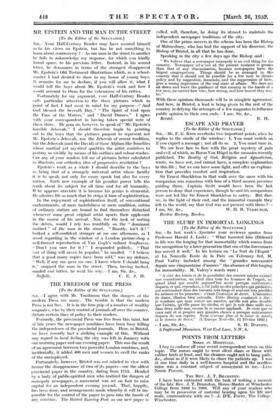MR. EPSTEIN AND THE MAN IN-THESTREET . .
[To the Editor of the SPECTATOR.] - *
SIR,--Your Half-Century Reader may have assured himself as to his views on Epstein, but has he not something to learn about controversy ? As one man in the street to another. he fails to acknowledge my response, for which you kindly. found space, to his previous letter. Instead, in his second letter, he denounces . in terms of the strongest disapproval Mr. Epstein's Old Testament illustrations which, as a school- master I had desired to show to my house of young boys. It remains for me to declare, if you will allow it, what I would tell the boys about Mr. Epstein's work and how I would account to them for the vehemence of his critics.
Fortunately for my argument, your Half-Century Reader
calls particular attention to the three pictures which in point of fact I had most in mind for my purpose—" And God blessed the Seventh Day," " The Spirit of God upon the Face of the Waters," and " David Dances." I agree with your correspondent in having taken special note of these three. He goes on, however, to speak of "Mr. Epstein's horrible Jehovah," I should therefore begin by pointing out to the boys that the pictures purport to represent not Mr. Epstein's Jehovah, nor the Jehovah of recent tradition, but the Jehovah (and the David) of those Afghan-like Iirielites whose martial yet mystical qualities the artist contrives to portray so vividly by means of his outlines and colour-washes. Can any of your readers tell me of pictures better calculated to illustrate our orthodox idea of progressive revelation ?
Epstein's work as a whole I should describe to the boys as being that of a strangely universal artist whose faculty it is to speak not only for every epoch but also for every nation. Each new example of his peculiar power tells the truth about its subject for all time and for all hunianity. If he appears atavistic it is because his genius is elemental. He admires life so much that he strips it bare of sophistication.
In the enjoyment of sophistication itself, of conventional enchantments, of mere tastefulness or mere erudition, critics of ordinary stature are bound to find themselves disturbed whenever some great original artist upsets their apple-cart in the course of his arrival. Nor, for the task of sorting the debris, would I rely too trustfully on the " dominant instinct " of _the man in the street. " Beastly, isn't it ! " barked a self-confident stranger at me one afternoon, as I stood regarding in the window of a London picture-shop a well-framed reproduction of Van Gogh's radiant Sunflowers. " Don't you care for' it ? " I responded politely. " That sort of thing will never be popular," he snarled. " I believe that a good many copies have been sold," was my defence. " Well, if any one gave me one, I know where I should hang it," snapped the man in the street. Then, having barked, snarled and bitten, he went his way.--I am, Sir, &c.,


































 Previous page
Previous page